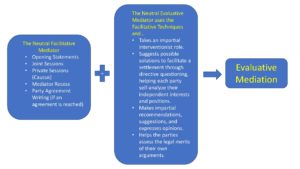Types of Mediation
ODR offers two types of mediation: facilitative and evaluative.
In facilitative mediation, the mediator will facilitate discussion between the parent and school about differing viewpoints. Parties will have the opportunity to offer an opening statement and the mediator will then assist parties in finding areas of agreement during the joint session. In a facilitative mediation, the mediator guides the parties to common ground without interjecting evaluative feedback. A facilitative mediator does not offer any opinion about the strength or weakness of either party’s position.
An evaluative mediation can be thought of as a facilitative mediation “with a reality check.” In evaluative mediation, the evaluative mediator is a neutral, special education expert, who uses educational and legal knowledge and experience to examine, with the parties, potential outcomes, with the ultimate goal of facilitating a collaborative agreement. The evaluative mediator starts with facilitative mediation techniques (opening statements, caucuses, questioning, brainstorming, etc.) and when parties get off track or stuck on a particular item, the evaluative mediator may step in to ask directive questions and offer feedback and suggestions for the parties’ consideration. Evaluative mediators might also brainstorm about potential outcomes of the issues and talk about what a hearing officer might be likely to decide. Although no one can predict what a judge will decide, looking at all the angles helps parties to better create a “party drafted” mediation agreement. All evaluative mediations will be held virtually with either Dr. Connie Lyttle, Dr. Vicki McGinley, Clymer Bardsley, Thomas Frost, Ruth Furman, and Catherine Greenstein (bio). Once parties request mediation, they can indicate they would like an evaluative mediation within the Mediation Information form that will be sent in a follow-up email.
In both facilitative and evaluative mediation, the mediator will not decide the dispute for the parties.

